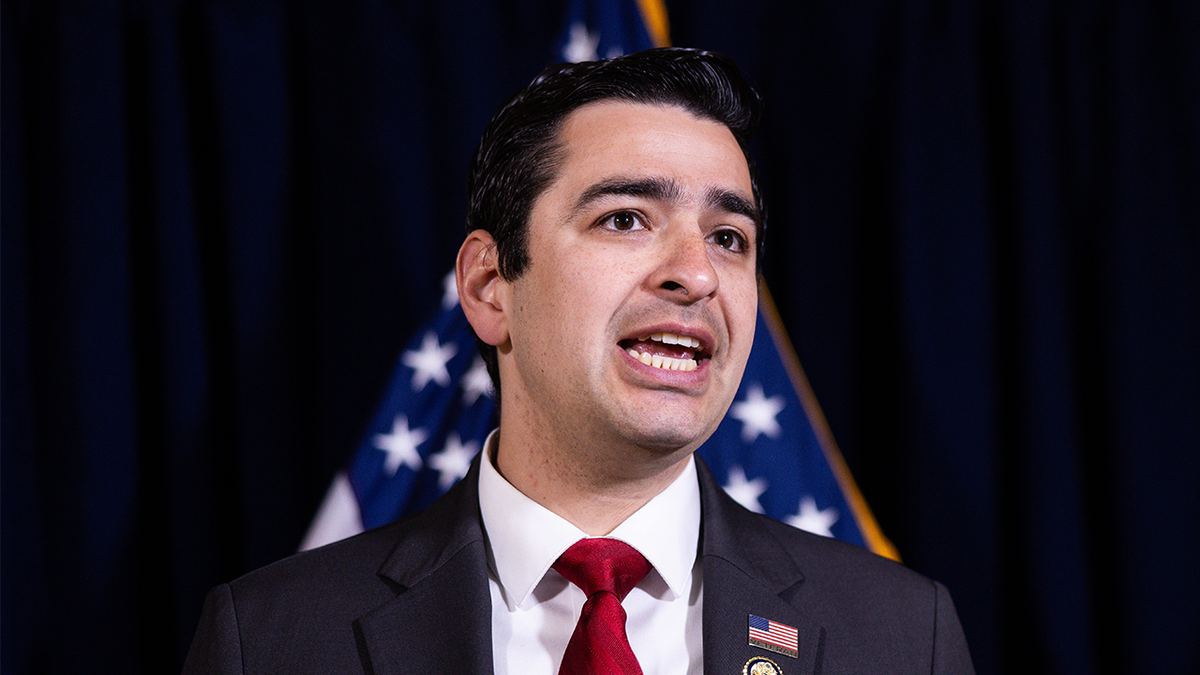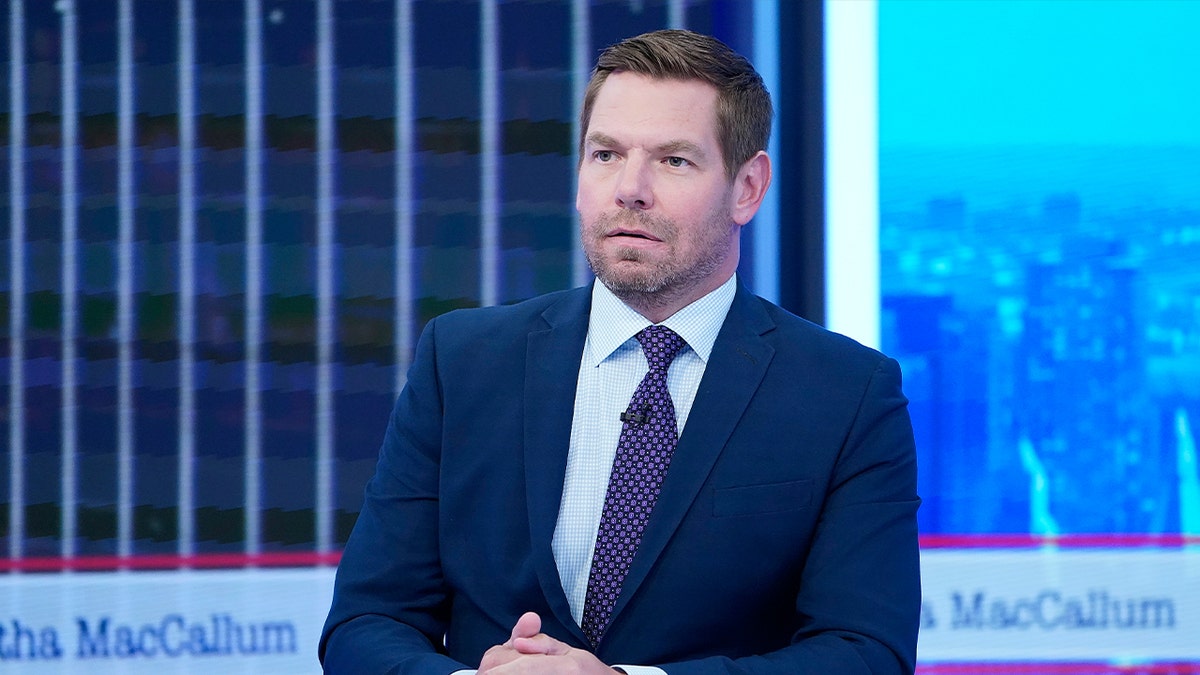INTERNACIONAL
Colorado deputy could face massive fine for sharing information with immigration authorities

NEWYou can now listen to Fox News articles!
An officer sued by Colorado Attorney General Phil Weiser for allegedly sharing information with federal immigration agents in violation of state law continues to be under investigation, but he could face a hefty fine.
«The complaint filed against the deputy is a civil lawsuit (not criminal). Violations of these laws … can result in an injunction and civil penalties up to $50,000,» Lawrence Pacheco, director of communications at the Colorado Attorney General’s Office, said in an email to Fox News Digital Friday.
Mesa County Sheriff’s Deputy Alexander Zwinck and another deputy were disciplined by the sheriff’s office for allegedly sharing information with federal immigration agents on a drug task force during a Brazilian college student’s arrest for an expired visa, according to The Associated Press.
COLORADO DEPUTIES VIOLATED NEW STATE LAW WHEN SHARING INFORMATION WITH FEDERAL IMMIGRATION AGENTS
This image from police body camera footage provided by the Mesa County Sheriff’s Office shows Deputy Alexander Zwinck conducting a traffic stop June 5, 2025, near Fruta, Colo. (Mesa County Sheriff’s Office via AP)
Mesa County Sheriff Todd Rowell said Caroline Dias-Goncalves, a 19-year-old nursing student, was pulled over by Zwinck for a traffic stop June 5 after she was allegedly driving too close to a semi-truck. While Dias-Goncalves was released with a warning after about 20 minutes, federal immigration agents stopped her and arrested her shortly after.
Zwinck was placed on three weeks of unpaid leave, and Erik Olson was placed on two weeks of unpaid leave, Rowell said in a statement. Both were removed from the task force.
Two supervisors were also disciplined, with one suspended without pay for two days and another receiving a letter of reprimand. A third supervisor received counseling.
FLORIDA AG REFUSES TO BACK DOWN AFTER CONTEMPT RULING IN STATE IMMIGRATION LAW BATTLE

Colorado Gov. Jared Polis speaks on stage during the third day of the Democratic National Convention at the United Center Aug. 21, 2024, in Chicago. (Justin Sullivan/Getty Images)
CLICK HERE FOR MORE IMMIGRATION COVERAGE
«Based on our findings, the Mesa County Sheriff’s Office should not have had any role in the chain of events leading to Miss Dias-Goncalves’s detention, and I regret that this occurred. I apologize to Miss Dias-Goncalves,» Mesa County Sheriff Todd Rowell said in a statement on Wednesday.
«I have pushed for collaboration with state and federal partners to solve crime in our community. In the area of drug interdiction, HSI has been our primary federal law enforcement partner. Although discussions were had with HSI supervision in the months preceding this incident to ensure my deputies would not be involved in immigration enforcement, the administrative review showed that those lines of collaboration were crossed.»
Colorado Gov. Jared Polis signed legislation earlier this year that prevents local governments from sharing immigration information with immigration officials at the federal level.
‘OBEY THE LAW’: CONSERVATIVE FIREBRAND TORCHES BLUE STATE IMMIGRATION POLICIES AMID MAJOR LAWSUIT

U.S. Rep. Gabe Evans, R-Colo., speaks at a news conference of the Republican National Committee after a meeting of the House Republican Conference March 4, 2025, in Washington, D.C. (Tierney L. Cross/Getty Images)
«Basically, this new law gives a narrow exception for Colorado law enforcement to cooperate with the federal government if ICE or the Department of Homeland Security asks for assistance in a particular crime investigation,» Kristi Burton Brown, executive vice president of Advance Colorado, wrote in an email to Fox News Digital.
«However, there is an absolute ban on local law enforcement proactively notifying DHS if they discover that a violent criminal or repeat felon is here illegally. If they report to ICE anyway, they will face a $50,000 fine.»
CLICK HERE TO GET THE FOX NEWS APP
The law preventing law enforcement from cooperating with the federal government in many circumstances was blasted by Rep. Gabe Evans, R-Colo., a former police officer.
«As a former cop, I know firsthand how Colorado’s sanctuary laws have flipped the switch on crime, handcuffing cops instead of criminals. Let me be clear: our state’s leftist laws don’t prioritize public safety, they prioritize political games,» Evans posted to X.
The Associated Press contributed to this report.
immigration,colorado,homeland security,police and law enforcement
INTERNACIONAL
Trump DOJ opens mortgage fraud probe into Eric Swalwell as congressman vows to keep fighting back

NEWYou can now listen to Fox News articles!
The Department of Justice under President Donald Trump has opened a probe into Rep. Eric Swalwell, D-Calif., over alleged mortgage fraud, Fox News has confirmed.
In response, Swalwell said he was not surprised to be targeted by Trump and vowed to keep speaking out while pursuing his lawsuit.
«As the most vocal critic of Donald Trump over the last decade and as the only person who still has a surviving lawsuit against him, the only thing I am surprised about is that it took him this long to come after me,» the California lawmaker said.
«Like James Comey and John Bolton, Adam Schiff and Lisa Cook, Letitia James and the dozens more to come – I refuse to live in fear in what was once the freest country in the world.
SWALWELL THREATENS ‘ACCOUNTABILITY’ TO PRIVATE ACTORS WHO DEAL WITH TRUMP, HOPE IT ‘DETERS PEOPLE’
Rep. Eric Swalwell, D-Calif., listens during a news conference on the introduction of their Protection from Abusive Passengers Act at the U.S. Capitol Building on April 6, 2022, in Washington, D.C. (Anna Moneymaker/Getty Images)
«Of course, I will not end my lawsuit against him. And I will not stop speaking out against the President and speaking up for Californians,» he continued. «As Mark Twain said, ‘Patriotism is supporting your country all the time, and your government when it deserves it.’ Mr. President, do better. Be better.»
The probe, which was first reported by NBC, will investigate allegations of millions of dollars in loans and refinancing were based on Swalwell declaring that his primary residence was in Washington, D.C., a person familiar with the referral told the news organization.
According to the report, the director of the Federal Housing Agency, Bill Pulte, sent Attorney General Pam Bondi a letter on Wednesday accusing Swalwell of possibly making false or misleading statements on loan documents.
HOW JAMES COMEY’S INDICTMENT COULD GO SOUTH FOR THE DOJ
The source also reportedly told NBC the investigation is into possible mortgage fraud, tax fraud at the state and local level, insurance fraud and any related crimes.
Fox News Digital has reached out to the Department of Justice for comment on the matter.
The news comes the same day that MSNBC reported that two sources confirmed Swalwell is looking at a run for governor in California.
The two sources reportedly told the news agency Swalwell has all but decided on the move, and one source even said the lawmaker could make an announcement as early as next week.
Fox News Digital has reached out to Swalwell’s office for confirmation on the matter.
MSNBC reported that Swalwell declined to comment on his gubernatorial ambitions.
SWALWELL, NEHLS CLASH AT CHILD MIGRANT HEARING OVER ALLEGED CHINESE SPY TIES: ‘YOU DON’T GET TO SAY THAT S—‘

Representative Eric Swalwell, D-Calif., was criminally referred to the DOJ for alleged mortgage fraud. (John Lamparski)
Swalwell has been one of Trump’s most outspoken critics, and last month he faced scrutiny over a «bizarre inconsistency» in his campaign’s Federal Election Commission filings that list several different reasons for payments to a Haitian American staffer totaling more than $360,000.
FEC filings from Swalwell for Congress and his Remedy PAC, dating back to 2021, show more than 75 payments to staffer Darly Meyer, ranging from $53 to more than $12,000 for various reasons.
Meyer received 27 payments last year totaling more than $120,000 and is on pace to earn a similar amount in 2025. The filings list multiple explanations for the disbursements, including travel, car and security services, and salary, as well as reimbursements for personal travel expenses, event flowers, and postage.
Over the years, Swalwell’s campaign has reported numerous expenditures on luxury car services, expensive restaurants, and high-end hotels in international cities such as Dubai, Berlin, Paris and London.
Swalwell also claimed there was strong evidence of collusion between Russia and Trump, but those claims have since been contradicted.
Durham’s report, released in 2023, found intelligence agencies lacked «actual evidence of collusion» to justify launching the Trump-Russia probe. The findings echoed Robert Mueller’s 2019 report, which found no criminal conspiracy between Trump’s campaign and Russia.
CLICK HERE TO DOWNLOAD THE FOX NEWS APP
This is a developing story and will be updated as more information becomes available.
eric swalwell,justice department,donald trump,investigations
INTERNACIONAL
Panorama Internacional: Chile, elecciones con sorpresa y las deudas pendientes del 2019
INTERNACIONAL
El acuerdo con EE.UU. selló el alineamiento de Milei con Trump, pero abrió interrogantes en el Mercosur

El acuerdo sobre comercio e inversiones anunciado entre Estados Unidos y la Argentina selló a fuego el total e inflexible alineamiento del gobierno de Javier Milei con Donald Trump, pero al mismo tiempo abrió una serie de interrogantes sobre cómo impactará este entendimiento en el futuro del Mercosur y la relación con Brasil.
No por nada el acuerdo se conoció en la misma semana que desde la Cancillería se anunció que Milei se ausentará de la futura cumbre del bloque prevista en diciembre en Foz de Iguazú, donde Lula da Silva entregará a Paraguay la presidencia pro-tempore del bloque.
Leé también: Punto por punto, todos los detalles del acuerdo comercial entre la Argentina y EE.UU.
El estatuto del pacto regional impide a los países miembro suscribir acuerdos comerciales en forma individual. Milei, como lo hizo el anterior gobierno de Uruguay de Luis Lacalle Pou, busca hacer más elásticas estas disposiciones y abrir el pacto.
“La Argentina no puede negociar bilateralmente ni hacer acuerdos por su cuenta. Pero esto es un acuerdo marco que el gobierno puede presentar como exploratorio”, dijo a TN el analista internacional Mauro Embe.
El Gobierno cuidó mucho las formas de este acuerdo. La Casa Blanca lo anunció a través de “una declaración conjunta sobre el marco para un acuerdo entre Estados Unidos y la Argentina sobre comercio e inversión recíprocos”. No se habló de un acuerdo comercial.
“Así puede manejar en cierta forma los tiempos”, indicó el analista.
¿Cómo reaccionarán los demás socios del Mercosur?
El gobierno tiene como gran aliado dentro del bloque al presidente paraguayo, Santiago Peña, con quien Milei tiene un aceitado vínculo por su estrecha afinidad ideológica. Ahora se suma Rodrigo Paz, flamante mandatario de Bolivia, el último país en incorporarse al bloque.
En la vereda de enfrente se encuentra en especial Luiz Lula da Silva, némesis de Milei en el Cono Sur, y el más pragmático mandatario progresista uruguayo, Yamandú Orsi. Luiz Inacio Lula da Silva y Javier Milei se vieron en Buenos Aires en la última cumbre del MERCOSUR (Vía Reuters)
“Lo que ha hecho el gobierno argentino es medio border. Está en el límite dentro de lo legal (que marca el estatuto del Mercosur). Esto podría generar una queja interna ante este avance unilateral”, dijo Embe.
Para el analista, “este acuerdo marco podría transformarse en un tratado, aunque en ningún lado se habla de un pacto de libre comercio. Lleva a futuros acuerdos. Fueron muy cautos en el nombre en este acuerdo marco para favorecer inversiones”, afirmó.
Leé también: Ser obeso o tener un hijo con discapacidad podría ser un motivo de rechazo de la visa para ingresar a EE.UU.
Ahora se abre un período de negociaciones en el seno del bloque. Si bien aún no fue definida una fecha de la cumbre, se estima que podría celebrarse el 20 de diciembre con las notorias ausencias de Milei y de Peña.
Cómo impactará el acuerdo con EE.UU. en la relación con Brasil
En este nuevo escenario no cabe duda de que el anunciado acuerdo entre Argentina y EE.UU. impactará de manera negativa en el difícil vínculo entre Buenos Aires y Brasilia.
“El primer impacto inmediato es el debilitamiento del Mercosur. Los acuerdos puntuales de país a país debilitan al bloque. Pero además, en función del conflicto que enfrenta a Brasil con EE.UU. en materia arancelaria, esto desgasta aún más la relación entre Milei y Lula que ya no era buena pero permanecía” sin cambios en el terreno comercial, dijo a TN el analista brasileño Marco Teixeira, de la Fundación Getúlio Vargas, de Río de Janeiro.
Leé también: Uruguay sufre una epidemia de homicidios: crece la inseguridad vinculada al narcotráfico
El acuerdo se sumará así a la anunciada ausencia de Milei de la cumbre del Mercosur en la que Brasil deberá traspasar la presidencia pro-témpore a Paraguay y donde espera anunciar el postergado tratado comercial con la Unión Europea (UE).
¿Qué pasará ahora con el Mercosur?
Milei cumplió el mandato de alinear a su gobierno detrás de la Casa Blanca en absolutamente todos los aspectos.
“Este es un punto más en el alineamiento total con EE.UU. Por supuesto esto tiene un precio. Más allá de la afinidad ideológica, Milei reduce la maniobrabilidad en ciertos sectores. Cuando un país se alinea tanto con una gran potencia cualquier margen de maniobra o pragmatismo se agota o se reduce”, dijo Embe.
En este contexto, el Mercosur está llamado a sufrir en los próximos 30 días fuertes turbulencias.
El analista internacional Juan Negri dijo a TN que la firma de este entendimiento con Washington “es una prueba más del estancamiento del bloque regional, de la incapacidad de adaptarse a nuevas realidades y de las visiones distintas que imperan en el interior del bloque”.
“El Mercosur se encuentra en una encrucijada. Tiene una estructura que le hace muy difícil reformarse porque tienen que estar todos los socios de acuerdo. Es un bloque agujereado que entra en tensión cada vez que en la Argentina y Brasil asumen gobiernos de derecha”, afirmó.
EE.UU, comercio

 CHIMENTOS3 días ago
CHIMENTOS3 días agoWada Nara se despidió de sus hijas con un desgarrador mensaje al entregárselas a Mauro Icardi: «Que la pasen hermoso»

 ECONOMIA2 días ago
ECONOMIA2 días agoGuiño al crédito fintech: el BCRA autorizará el débito directo de cuotas, prohibido durante el Gobierno anterior

 POLITICA3 días ago
POLITICA3 días agoEn Formosa cobran un impuesto a los camiones para poder circular: piden que el gobierno nacional intervenga




























